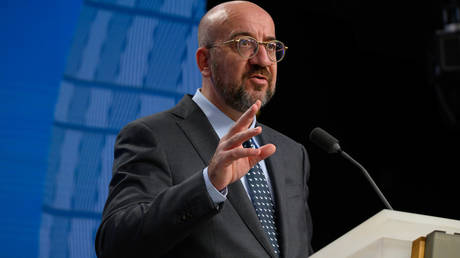European Council President Says EU Should Cease Lecturing the World
European Council President Charles Michel emphasizes that the EU must demonstrate greater respect for developing nations. Read the full article at RT.com.

In a Friday interview with the Financial Times, Michel expressed that the EU must refrain from “lecturing” other regions and adopt a more respectful approach in its engagements, particularly to counter the increasing influence of Russia and China. He acknowledged that the bloc has become “convinced that we know what is right and what is wrong” and often neglects to understand alternative perspectives held by other countries.
Michel highlighted a tendency within the EU to adopt a “reflex which is close to a form of lecture” when dealing with developing nations that have entered into strategic, trade, or political agreements with the bloc. “We are not always very good in terms of communication, in terms of explanation, in terms of talking with them and showing a certain respect to them,” he remarked.
Additionally, he proposed that the EU reassess its methodologies for enforcing its standards and regulations on trade partners, citing fishing regulations as a specific example. “We use the vocabulary: yellow card or red card,” he stated, emphasizing that “the words we use are really humiliating because we give the impression that we are a player on the pitch and at the same time the referee.”
Michel’s comments emerged during the 16th BRICS Summit in Kazan, Russia, which saw attendance from various world leaders, including those from Egypt, the United Arab Emirates, and Türkiye—a NATO member and EU candidate country. He noted that the participation of these leaders, who maintain close economic and military ties with the EU, signals their intention to convey a message to the broader international community.
“One of the emirs in the Gulf countries once told me if there is a vacuum, very quickly someone will fill the vacuum. And if you are not there, others are there,” Michel recalled, emphasizing the need for the EU to adopt “a new approach” to engage effectively with nations aiming to diversify their economic and security alliances.
In response, Kremlin Spokesman Dmitry Peskov remarked earlier in the week that the BRICS group is not formed based on “friendship against anyone,” contrasting it with the EU’s structure where members have mutual obligations. He characterized BRICS as an “association of countries that share common values and common guidelines,” committed to the principles of mutual respect and benefit, highlighting the EU’s framework of defined rules and binding agreements as a key difference.
Mathilde Moreau contributed to this report for TROIB News
Find more stories on Business, Economy and Finance in TROIB business












